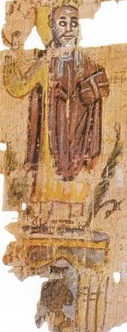
Theophilus I of Alexandria
Theophilus (Greek: Θεόφιλος) was the 23rd Pope of Alexandria and Patriarch of the Seat of Saint Mark. He became pope at a time of conflict between the newly dominant Christians and the pagan establishment in Alexandria, each of which was supported by a segment of the Alexandrian populace.
Saint
Theophilus of Alexandria
384
15 October 412
15 October 412
Dominicium, Alexandria
18 Paopi (Coptic calendar)
15 October (Julian calendar)
Currently 28 October (Gregorian calendar)
Theophilus’ Paschal table[edit]
Theophilus obliged the pious Christian emperor Theodosius I (AD 379–395) to himself by dedicating his Paschal table to him (around AD 390).[4] Theophilus’ Paschal table did not survive, but what we do know is that the Metonic 19-year lunar cycle underlying it must have been very different from the very first similar lunar cycle which somewhere in the third quarter of the third century was invented by Anatolius but differed very little from the classical Alexandrian 19-year lunar cycle,[5] which in the fifth century would be introduced by Annianus and adopted by Theophilus’ successor Cyrillus and whose Julian equivalent would become the Metonic basic structure of Dionysius Exiguus’ Paschal table.[6] Bede's Paschal table is an exact extension of Dionysius Exiguus' one.[7]
In popular culture[edit]
Theophilus appears in the novel Flow Down Like Silver, Hypatia of Alexandria by Ki Longfellow.
He appears as a character played by Manuel Cauchi in the 2009 film Agora, directed by Alejandro Amenábar.
Legacy[edit]
The lunar crater Theophilus was named after him, as part of a group of three lunar craters named after prominent Alexandrian Christians.
Pope Theophilus is venerated as a saint only within the Coptic Church of Alexandria; his sainthood is not recognized by the Eastern Orthodox, Roman Catholic, or Assyrian Churches.